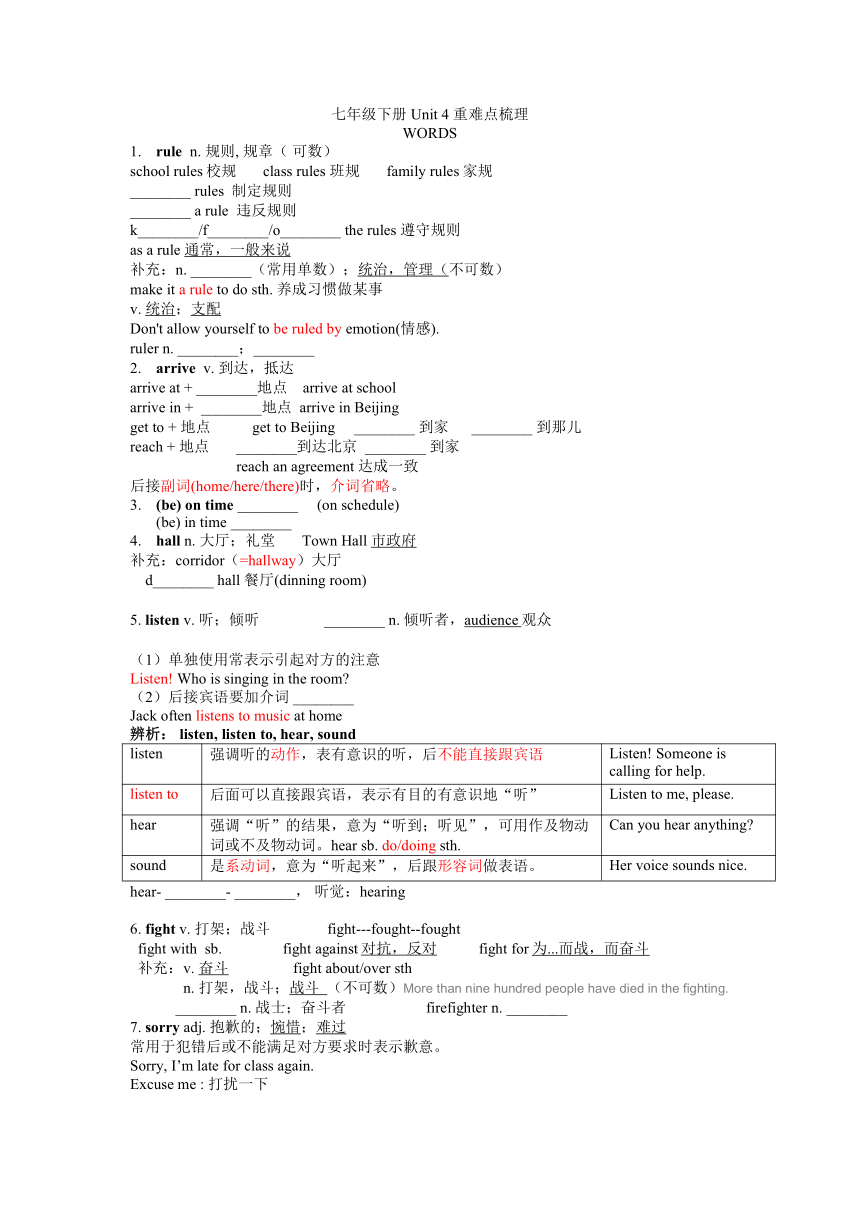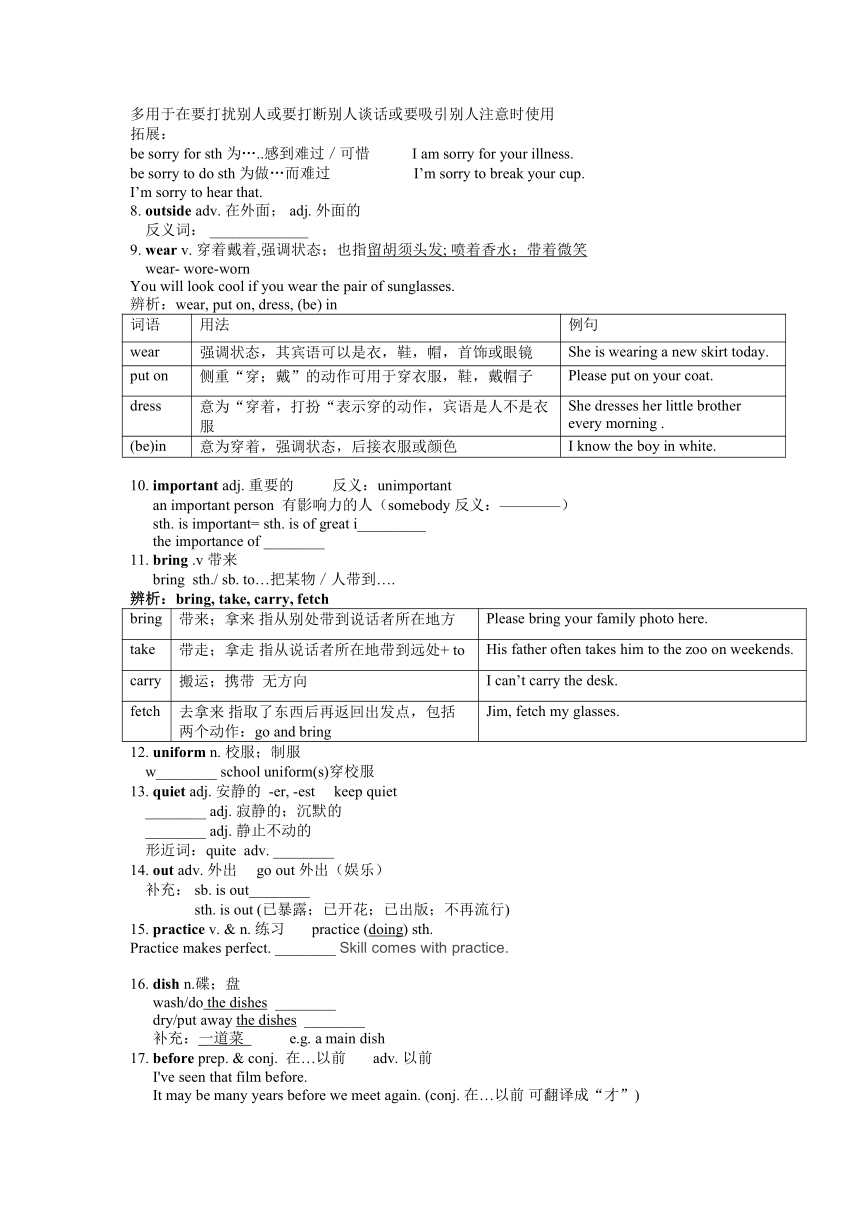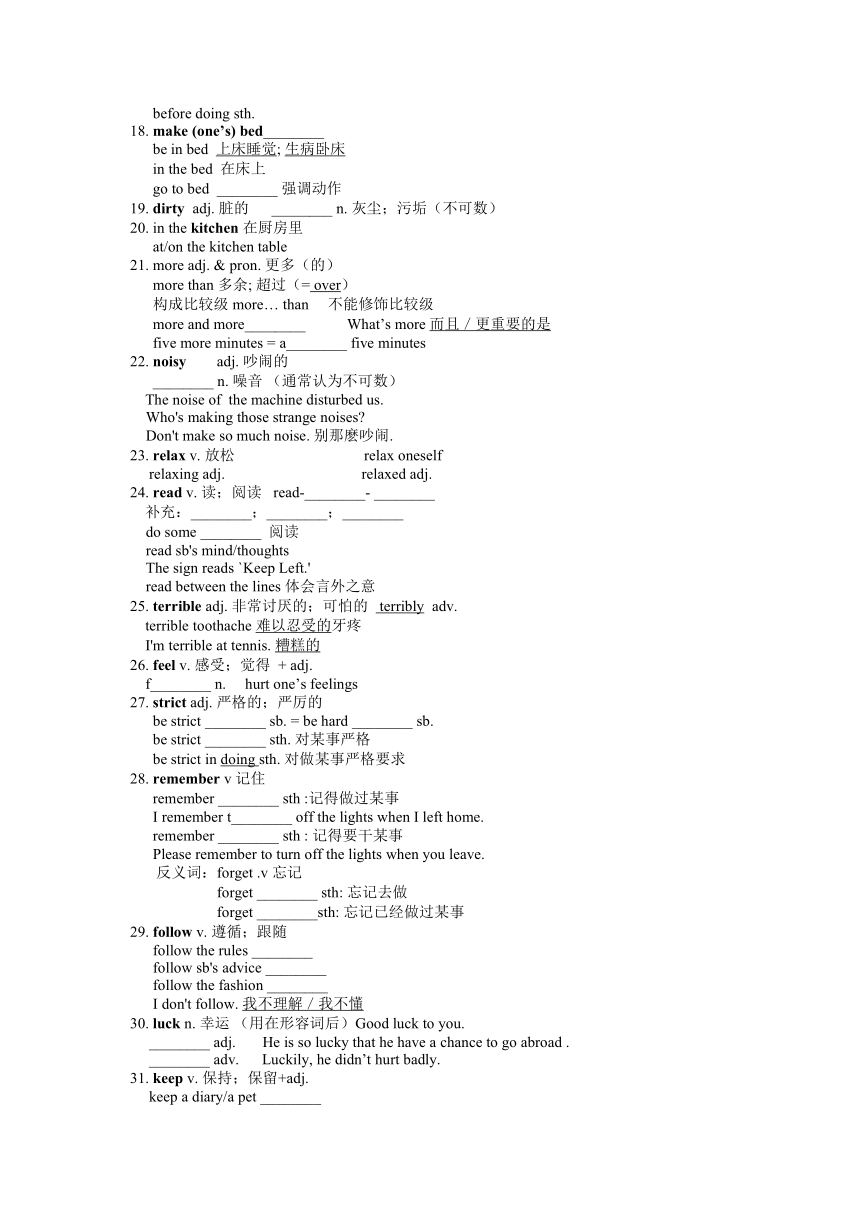人教版七年级下册Unit4Don't eat in class.重难点梳理
文档属性
| 名称 | 人教版七年级下册Unit4Don't eat in class.重难点梳理 |

|
|
| 格式 | docx | ||
| 文件大小 | 33.0KB | ||
| 资源类型 | 教案 | ||
| 版本资源 | 人教新目标(Go for it)版 | ||
| 科目 | 英语 | ||
| 更新时间 | 2024-04-19 15:21:25 | ||
图片预览



文档简介
七年级下册Unit 4 重难点梳理
WORDS
rule n. 规则, 规章( 可数)
school rules校规 class rules 班规 family rules家规
________ rules 制定规则
________ a rule 违反规则
k________/f________/o________ the rules 遵守规则
as a rule 通常,一般来说
补充:n. ________(常用单数);统治,管理(不可数)
make it a rule to do sth. 养成习惯做某事
v. 统治;支配
Don't allow yourself to be ruled by emotion(情感).
ruler n. ________;________
arrive v. 到达,抵达
arrive at + ________地点 arrive at school
arrive in + ________地点 arrive in Beijing
get to + 地点 get to Beijing ________ 到家 ________ 到那儿
reach + 地点 ________到达北京 ________ 到家
reach an agreement 达成一致
后接副词(home/here/there)时,介词省略。
(be) on time ________ (on schedule)
(be) in time ________
hall n. 大厅;礼堂 Town Hall 市政府
补充:corridor(=hallway)大厅
d________ hall 餐厅(dinning room)
5. listen v. 听;倾听 ________ n. 倾听者,audience观众
(1)单独使用常表示引起对方的注意
Listen! Who is singing in the room
(2)后接宾语要加介词 ________
Jack often listens to music at home
辨析: listen, listen to, hear, sound
listen 强调听的动作,表有意识的听,后不能直接跟宾语 Listen! Someone is calling for help.
listen to 后面可以直接跟宾语,表示有目的有意识地“听” Listen to me, please.
hear 强调“听”的结果,意为“听到;听见”,可用作及物动词或不及物动词。hear sb. do/doing sth. Can you hear anything
sound 是系动词,意为“听起来”,后跟形容词做表语。 Her voice sounds nice.
hear- ________- ________, 听觉:hearing
6. fight v. 打架;战斗 fight---fought--fought
fight with sb. fight against对抗,反对 fight for为...而战,而奋斗
补充:v. 奋斗 fight about/over sth
n. 打架,战斗;战斗 (不可数)More than nine hundred people have died in the fighting.
________ n. 战士;奋斗者 firefighter n. ________
7. sorry adj. 抱歉的;惋惜;难过
常用于犯错后或不能满足对方要求时表示歉意。
Sorry, I’m late for class again.
Excuse me : 打扰一下
多用于在要打扰别人或要打断别人谈话或要吸引别人注意时使用
拓展:
be sorry for sth 为…..感到难过/可惜 I am sorry for your illness.
be sorry to do sth 为做…而难过 I’m sorry to break your cup.
I’m sorry to hear that.
8. outside adv. 在外面; adj. 外面的
反义词: _____________
9. wear v. 穿着戴着,强调状态;也指留胡须头发; 喷着香水;带着微笑
wear- wore-worn
You will look cool if you wear the pair of sunglasses.
辨析:wear, put on, dress, (be) in
词语 用法 例句
wear 强调状态,其宾语可以是衣,鞋,帽,首饰或眼镜 She is wearing a new skirt today.
put on 侧重“穿;戴”的动作可用于穿衣服,鞋,戴帽子 Please put on your coat.
dress 意为“穿着,打扮“表示穿的动作,宾语是人不是衣服 She dresses her little brother every morning .
(be)in 意为穿着,强调状态,后接衣服或颜色 I know the boy in white.
10. important adj. 重要的 反义:unimportant
an important person 有影响力的人(somebody 反义:————)
sth. is important= sth. is of great i_________
the importance of ________
11. bring .v 带来
bring sth./ sb. to…把某物/人带到….
辨析:bring, take, carry, fetch
bring 带来;拿来 指从别处带到说话者所在地方 Please bring your family photo here.
take 带走;拿走 指从说话者所在地带到远处+ to His father often takes him to the zoo on weekends.
carry 搬运;携带 无方向 I can’t carry the desk.
fetch 去拿来 指取了东西后再返回出发点,包括两个动作:go and bring Jim, fetch my glasses.
12. uniform n. 校服;制服
w________ school uniform(s)穿校服
13. quiet adj. 安静的 -er, -est keep quiet
________ adj. 寂静的;沉默的
________ adj. 静止不动的
形近词:quite adv. ________
14. out adv. 外出 go out 外出(娱乐)
补充: sb. is out________
sth. is out (已暴露;已开花;已出版;不再流行)
15. practice v. & n. 练习 practice (doing) sth.
Practice makes perfect. ________ Skill comes with practice.
16. dish n.碟;盘
wash/do the dishes ________
dry/put away the dishes ________
补充:一道菜 e.g. a main dish
17. before prep. & conj. 在…以前 adv. 以前
I've seen that film before.
It may be many years before we meet again. (conj. 在…以前 可翻译成“才”)
before doing sth.
18. make (one’s) bed________
be in bed 上床睡觉; 生病卧床
in the bed 在床上
go to bed ________ 强调动作
19. dirty adj. 脏的 ________ n. 灰尘;污垢(不可数)
20. in the kitchen 在厨房里
at/on the kitchen table
21. more adj. & pron. 更多(的)
more than 多余; 超过(= over)
构成比较级more… than 不能修饰比较级
more and more________ What’s more 而且/更重要的是
five more minutes = a________ five minutes
22. noisy adj. 吵闹的
________ n. 噪音 (通常认为不可数)
The noise of the machine disturbed us.
Who's making those strange noises
Don't make so much noise. 别那麽吵闹.
23. relax v. 放松 relax oneself
relaxing adj. relaxed adj.
24. read v. 读;阅读 read-________- ________
补充:________;________;________
do some ________ 阅读
read sb's mind/thoughts
The sign reads `Keep Left.'
read between the lines 体会言外之意
25. terrible adj. 非常讨厌的;可怕的 terribly adv.
terrible toothache 难以忍受的牙疼
I'm terrible at tennis. 糟糕的
26. feel v. 感受;觉得 + adj.
f________ n. hurt one’s feelings
27. strict adj. 严格的;严厉的
be strict ________ sb. = be hard ________ sb.
be strict ________ sth. 对某事严格
be strict in doing sth. 对做某事严格要求
28. remember v 记住
remember ________ sth :记得做过某事
I remember t________ off the lights when I left home.
remember ________ sth : 记得要干某事
Please remember to turn off the lights when you leave.
反义词:forget .v 忘记
forget ________ sth: 忘记去做
forget ________sth: 忘记已经做过某事
29. follow v. 遵循;跟随
follow the rules ________
follow sb's advice ________
follow the fashion ________
I don't follow. 我不理解/我不懂
30. luck n. 幸运 (用在形容词后)Good luck to you.
________ adj. He is so lucky that he have a chance to go abroad .
________ adv. Luckily, he didn’t hurt badly.
31. keep v. 保持;保留+adj.
keep a diary/a pet ________
keep a promise/one’s word ________
keep (on) doing sth. ________
The sign says/reads `Keep Left'. ________
keep sb. doing ________
32. hair n. 头发(不可数)
straight / curly / wavy / thick hair ________
have one's hair cut ________
grey hair 白发
33. learn v. 学习 learn from sb.向...学习
learn to do学习做,学会做
learn of sth 听到,获悉
learn sth by________ 自学
learn a l________ 学到一个教训
PHRASES&SENTENCES
Section A
Don’t arrive l_______ for class.
I am running late already.
arrive late for = be late for 都表示“……..迟到”
arrive late for 侧重于到达时间晚
Don’t arrive late for the meeting next time.
be late for 侧重于状态
The naughty boy is late for school every day.
2.You must be on time.
3. Don’t listen to music in class.
4. Can you bring music players to school?
Section B
There are too many rules.
too many + 可数名词 “太多” too many books 太多的书
too much + 不可数名词“太多” too much homework 太多的家庭作业
much too + 形容词/副词 “非常,太”It is much too cold today. 今天非常冷
2. Don’t leave the dirty dishes in the kitchen.
3. At school, we have more rules--don’t be noisy, don’t eat in class.
4. I can’t relax either.
5. I must read a book before I can watch TV.
6. Parents and schools are sometimes strict, but remember, they make rules to help us.
help sb. (to) do sth :帮助某人做某事
help sb with sth:在某方面帮助某人
GRAMMAR
1.祈使句
通常用来表示命令、请求、禁止、建议、警告等语气。它的主语you(听话人)通常省略。其构成通常有以下几种形式。
1)Be型(即系动词原型be+ adj +其他)。
如:Be quiet, please. 否定句Don’t + be+ adj +其他。
如:Don’t be angry.
2)Do型(即系动词原形+宾语+其他)。
如: Open you books, please. 否定句Don’t +实义动词原形+宾语+其他。
如:Don’t eat in the classroom.
3)Let型(即Let+宾语+动词原形+其他)如: Let me help you. Let’s go at six o’clock
否定句一般在宾语后加not。如: Let’s not watch TV.
4)No +V-ing型(此种形式通常用于公共场合的提示语中,意为“禁止做某事“)如: No smoking! 严禁吸烟! No talking! 不许交谈! No passing! 禁止通行! No parking! 不许停车
5)No+ N 型 (No +n= Not any)
如:No photos
2.情态动词
1. 情态动词have to 的用法,意思是"必须、不得不",它侧重于客观上的必要,不得已要做。 Must “禁止”,表主观上的看法或者要求。
(1)结构:主语+have to+动词原形+其他 (一般现在时,主语是第三人称单数时,用has to;句子是过去时,用had to.
We have to wear sneakers for gym class.
I had to get up at 5:00 am last Monday.
(2)否定形式:主语+don't have to+动词原形+其他
(一般现在时,主语是第三人称单数时,用doesn't have to. 句子是过去时,用didn't have to)
Nick doesn't have to wear a uniform.
We didn't have to do our homework at once.
(3)疑问句:Do (Does或Did)+主语+have to +动词原形+其他
Do you have to stay at home on weekends
Yes, I do. / No, I don't.
Did he have to go to bed by 11:00 last night
WORDS
rule n. 规则, 规章( 可数)
school rules校规 class rules 班规 family rules家规
________ rules 制定规则
________ a rule 违反规则
k________/f________/o________ the rules 遵守规则
as a rule 通常,一般来说
补充:n. ________(常用单数);统治,管理(不可数)
make it a rule to do sth. 养成习惯做某事
v. 统治;支配
Don't allow yourself to be ruled by emotion(情感).
ruler n. ________;________
arrive v. 到达,抵达
arrive at + ________地点 arrive at school
arrive in + ________地点 arrive in Beijing
get to + 地点 get to Beijing ________ 到家 ________ 到那儿
reach + 地点 ________到达北京 ________ 到家
reach an agreement 达成一致
后接副词(home/here/there)时,介词省略。
(be) on time ________ (on schedule)
(be) in time ________
hall n. 大厅;礼堂 Town Hall 市政府
补充:corridor(=hallway)大厅
d________ hall 餐厅(dinning room)
5. listen v. 听;倾听 ________ n. 倾听者,audience观众
(1)单独使用常表示引起对方的注意
Listen! Who is singing in the room
(2)后接宾语要加介词 ________
Jack often listens to music at home
辨析: listen, listen to, hear, sound
listen 强调听的动作,表有意识的听,后不能直接跟宾语 Listen! Someone is calling for help.
listen to 后面可以直接跟宾语,表示有目的有意识地“听” Listen to me, please.
hear 强调“听”的结果,意为“听到;听见”,可用作及物动词或不及物动词。hear sb. do/doing sth. Can you hear anything
sound 是系动词,意为“听起来”,后跟形容词做表语。 Her voice sounds nice.
hear- ________- ________, 听觉:hearing
6. fight v. 打架;战斗 fight---fought--fought
fight with sb. fight against对抗,反对 fight for为...而战,而奋斗
补充:v. 奋斗 fight about/over sth
n. 打架,战斗;战斗 (不可数)More than nine hundred people have died in the fighting.
________ n. 战士;奋斗者 firefighter n. ________
7. sorry adj. 抱歉的;惋惜;难过
常用于犯错后或不能满足对方要求时表示歉意。
Sorry, I’m late for class again.
Excuse me : 打扰一下
多用于在要打扰别人或要打断别人谈话或要吸引别人注意时使用
拓展:
be sorry for sth 为…..感到难过/可惜 I am sorry for your illness.
be sorry to do sth 为做…而难过 I’m sorry to break your cup.
I’m sorry to hear that.
8. outside adv. 在外面; adj. 外面的
反义词: _____________
9. wear v. 穿着戴着,强调状态;也指留胡须头发; 喷着香水;带着微笑
wear- wore-worn
You will look cool if you wear the pair of sunglasses.
辨析:wear, put on, dress, (be) in
词语 用法 例句
wear 强调状态,其宾语可以是衣,鞋,帽,首饰或眼镜 She is wearing a new skirt today.
put on 侧重“穿;戴”的动作可用于穿衣服,鞋,戴帽子 Please put on your coat.
dress 意为“穿着,打扮“表示穿的动作,宾语是人不是衣服 She dresses her little brother every morning .
(be)in 意为穿着,强调状态,后接衣服或颜色 I know the boy in white.
10. important adj. 重要的 反义:unimportant
an important person 有影响力的人(somebody 反义:————)
sth. is important= sth. is of great i_________
the importance of ________
11. bring .v 带来
bring sth./ sb. to…把某物/人带到….
辨析:bring, take, carry, fetch
bring 带来;拿来 指从别处带到说话者所在地方 Please bring your family photo here.
take 带走;拿走 指从说话者所在地带到远处+ to His father often takes him to the zoo on weekends.
carry 搬运;携带 无方向 I can’t carry the desk.
fetch 去拿来 指取了东西后再返回出发点,包括两个动作:go and bring Jim, fetch my glasses.
12. uniform n. 校服;制服
w________ school uniform(s)穿校服
13. quiet adj. 安静的 -er, -est keep quiet
________ adj. 寂静的;沉默的
________ adj. 静止不动的
形近词:quite adv. ________
14. out adv. 外出 go out 外出(娱乐)
补充: sb. is out________
sth. is out (已暴露;已开花;已出版;不再流行)
15. practice v. & n. 练习 practice (doing) sth.
Practice makes perfect. ________ Skill comes with practice.
16. dish n.碟;盘
wash/do the dishes ________
dry/put away the dishes ________
补充:一道菜 e.g. a main dish
17. before prep. & conj. 在…以前 adv. 以前
I've seen that film before.
It may be many years before we meet again. (conj. 在…以前 可翻译成“才”)
before doing sth.
18. make (one’s) bed________
be in bed 上床睡觉; 生病卧床
in the bed 在床上
go to bed ________ 强调动作
19. dirty adj. 脏的 ________ n. 灰尘;污垢(不可数)
20. in the kitchen 在厨房里
at/on the kitchen table
21. more adj. & pron. 更多(的)
more than 多余; 超过(= over)
构成比较级more… than 不能修饰比较级
more and more________ What’s more 而且/更重要的是
five more minutes = a________ five minutes
22. noisy adj. 吵闹的
________ n. 噪音 (通常认为不可数)
The noise of the machine disturbed us.
Who's making those strange noises
Don't make so much noise. 别那麽吵闹.
23. relax v. 放松 relax oneself
relaxing adj. relaxed adj.
24. read v. 读;阅读 read-________- ________
补充:________;________;________
do some ________ 阅读
read sb's mind/thoughts
The sign reads `Keep Left.'
read between the lines 体会言外之意
25. terrible adj. 非常讨厌的;可怕的 terribly adv.
terrible toothache 难以忍受的牙疼
I'm terrible at tennis. 糟糕的
26. feel v. 感受;觉得 + adj.
f________ n. hurt one’s feelings
27. strict adj. 严格的;严厉的
be strict ________ sb. = be hard ________ sb.
be strict ________ sth. 对某事严格
be strict in doing sth. 对做某事严格要求
28. remember v 记住
remember ________ sth :记得做过某事
I remember t________ off the lights when I left home.
remember ________ sth : 记得要干某事
Please remember to turn off the lights when you leave.
反义词:forget .v 忘记
forget ________ sth: 忘记去做
forget ________sth: 忘记已经做过某事
29. follow v. 遵循;跟随
follow the rules ________
follow sb's advice ________
follow the fashion ________
I don't follow. 我不理解/我不懂
30. luck n. 幸运 (用在形容词后)Good luck to you.
________ adj. He is so lucky that he have a chance to go abroad .
________ adv. Luckily, he didn’t hurt badly.
31. keep v. 保持;保留+adj.
keep a diary/a pet ________
keep a promise/one’s word ________
keep (on) doing sth. ________
The sign says/reads `Keep Left'. ________
keep sb. doing ________
32. hair n. 头发(不可数)
straight / curly / wavy / thick hair ________
have one's hair cut ________
grey hair 白发
33. learn v. 学习 learn from sb.向...学习
learn to do学习做,学会做
learn of sth 听到,获悉
learn sth by________ 自学
learn a l________ 学到一个教训
PHRASES&SENTENCES
Section A
Don’t arrive l_______ for class.
I am running late already.
arrive late for = be late for 都表示“……..迟到”
arrive late for 侧重于到达时间晚
Don’t arrive late for the meeting next time.
be late for 侧重于状态
The naughty boy is late for school every day.
2.You must be on time.
3. Don’t listen to music in class.
4. Can you bring music players to school?
Section B
There are too many rules.
too many + 可数名词 “太多” too many books 太多的书
too much + 不可数名词“太多” too much homework 太多的家庭作业
much too + 形容词/副词 “非常,太”It is much too cold today. 今天非常冷
2. Don’t leave the dirty dishes in the kitchen.
3. At school, we have more rules--don’t be noisy, don’t eat in class.
4. I can’t relax either.
5. I must read a book before I can watch TV.
6. Parents and schools are sometimes strict, but remember, they make rules to help us.
help sb. (to) do sth :帮助某人做某事
help sb with sth:在某方面帮助某人
GRAMMAR
1.祈使句
通常用来表示命令、请求、禁止、建议、警告等语气。它的主语you(听话人)通常省略。其构成通常有以下几种形式。
1)Be型(即系动词原型be+ adj +其他)。
如:Be quiet, please. 否定句Don’t + be+ adj +其他。
如:Don’t be angry.
2)Do型(即系动词原形+宾语+其他)。
如: Open you books, please. 否定句Don’t +实义动词原形+宾语+其他。
如:Don’t eat in the classroom.
3)Let型(即Let+宾语+动词原形+其他)如: Let me help you. Let’s go at six o’clock
否定句一般在宾语后加not。如: Let’s not watch TV.
4)No +V-ing型(此种形式通常用于公共场合的提示语中,意为“禁止做某事“)如: No smoking! 严禁吸烟! No talking! 不许交谈! No passing! 禁止通行! No parking! 不许停车
5)No+ N 型 (No +n= Not any)
如:No photos
2.情态动词
1. 情态动词have to 的用法,意思是"必须、不得不",它侧重于客观上的必要,不得已要做。 Must “禁止”,表主观上的看法或者要求。
(1)结构:主语+have to+动词原形+其他 (一般现在时,主语是第三人称单数时,用has to;句子是过去时,用had to.
We have to wear sneakers for gym class.
I had to get up at 5:00 am last Monday.
(2)否定形式:主语+don't have to+动词原形+其他
(一般现在时,主语是第三人称单数时,用doesn't have to. 句子是过去时,用didn't have to)
Nick doesn't have to wear a uniform.
We didn't have to do our homework at once.
(3)疑问句:Do (Does或Did)+主语+have to +动词原形+其他
Do you have to stay at home on weekends
Yes, I do. / No, I don't.
Did he have to go to bed by 11:00 last night
同课章节目录
- Unit 1 Can you play the guitar?
- Section A
- Section B
- Unit 2 What time do you go to school?
- Section A
- Section B
- Unit 3 How do you get to school?
- Section A
- Section B
- Unit 4 Don't eat in class.
- Section A
- Section B
- Unit 5 Why do you like pandas?
- Section A
- Section B
- Unit 6 I'm watching TV.
- Section A
- Section B
- Review of Units 1-6
- Unit 7 It's raining!
- Section A
- Section B
- Unit 8 Is there a post office near here?
- Section A
- Section B
- Unit 9 What does he look like?
- Section A
- Section B
- Unit 10 I'd like some noodles.
- Section A
- Section B
- Unit 11 How was your school trip?
- Section A
- Section B
- Unit 12 What did you do last weekend?
- Section A
- Section B
